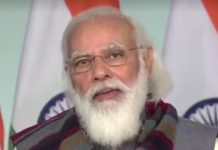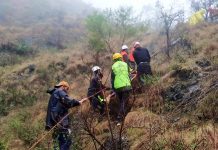The Supreme Court recently asked the chief secretaries of 12 states — Jammu and Kashmir, Manipur, Meghalaya, Mizoram, Nagaland, Puducherry, Tamil Nadu, Telangana, Tripura, Arunachal Pradesh, Delhi and West Bengal — to specify why they have not appointed a Lokayukta. A bench of Justices Ranjan Gogoi and R Banumathi on March 23 also asked the chief secretary of Odisha to apprise the court about the status of the Lokayukta in the state, adding that the apex court has no information whether it has an anti-corruption ombudsman or not.
The move coincided with the launch of Anna Hazare’s second indefinite hunger strike against the Centre at New Delhi’s Ramlila Maidan — the same place where he had started his anti-corruption movement against the UPA government seven years ago. However, things have changed a lot since then. Compared to 2011, when the India Against Corruption movement featured the who’s who of social activism, politics and other related fields, the anti-corruption crusader is much lonely on the stage this time. The two men who were seen with him were former Karnataka Lokayukta Santosh Hegde and former Haryana Lokayukta Pritam Pal.
The apex court’s direction had come in the wake of Advocate and Delhi BJP leader Ashwini Kumar Upadhyay’s plea, which alleged that many state governments are «deliberately weakening» the Lokayukta by not providing adequate infrastructure, sufficient budget and workforce. According to the PIL, the Lokpal and Lokayuktas Act, 2013, received Presidential assent on January 1, 2014 and came into force from January 16, 2014 but the executive has not established a Lokpal yet.
To understand why Lokayukta’s appointments are delayed or they are not allowed to function independently, it is important to know its role and authority. This anti-corruption ombudsman organisation, once appointed, cannot be dismissed nor transferred by the state government, and can only be removed by passing an impeachment motion by the state assembly. The Lokayukta, along with the Income Tax Department and the Anti-Corruption Bureau (ACB), mainly helps people publicise corruption among politicians and government officials. Many actions of the Lokayukta have resulted in criminal or other consequences for those charged.
In Madhya Pradesh, for example, as many as thirty-four IAS officers are facing Lokayukta probe for irregularities committed by them during their postings at various government departments. Many of these probes have been underway for the past six to eight years. Separately, about 11 IAS officers are facing probe by Economic Offense Wing (EOW) of state police, Congress MLA and former minister Ramniwas Rawat recently told the State Assembly.
Rajasthan Lokayukta Sajjan Singh Kothari, who has been granted extension of three years in office, last month revealed that there were 885 complaints against the Revenue Department, followed by 860 against the Urban Development and Housing Department, 814 against the Police Department and 755 against the Rural Development Department. In his 32nd annual report submitted to Governor Kalyan Singh on March 23, he also pointed out that disciplinary action was taken against 407 public servants as a result of action from the Lokayukta Secretariat during 2017-18.
However, imparting the duties of the Lokayukta is not easy as it involves bringing influential individuals to book. “Even after 70 years of Independence, people believe that corruption is a mode of administration. No work can be done without influence and money. There are hardly 10-20 per cent good officers. But they also suffer a lot for raising their voice,” said Justice Subhash B Adi, who retired as Upa Lokayukta of Karnataka. “In Lokayukta, only clerical staff are independent. But the police wing and the technical wing, whose role is greater in bringing culprits behind bars, are not independent. The ACB is not independent as it is under the government. Then how is it free from government intervention? There cannot be reasonable investigation. If they don’t probe any cases, that doesn’t mean there is no corruption.”
Most recently, Haryana Lokayukta’s office had complained about non-cooperative attitude of panchayati raj, urban bodies and town and country planning departments when it comes to compliance of reports or directions issued by it from time to time. In his 186-page report submitted to the Haryana governor, Lokayukta Justice NK Aggarwal (Retd) had highlighted the plight of his office in the absence of regular staff. According to the report, the pendency of cases has gone up to 1,358,.
The difficulties these ombudsman face are not limited administrative implementation. Many times, their lives are in danger. The recent attack on Karnataka’s Lokayukta Justice P Vishwanath Shetty, who was stabbed multiple times by a visitor at his office, is the latest example. The assailant was apprehended by the security staff as soon as he came out of Justice Shetty’s chambers with a knife in hand. Tejraj Sharma was reportedly upset that his complaint to the anti-corruption ombudsman did not bring him relief. Thus, Lokayuktas face threats not only from alleged high-profile culprits but also from dissatisfied victims.
On the political front, many state governments avoid appointing Lokayuktas for the obvious reason of coming under their scanner and go to any extent to make excuses. Uttarakhand Chief Minister Trivendra Singh Rawat, for example, was recently quoted as saying that a Lokayukta law “is redundant” in the state as the BJP government was walking the talk on its anti-graft policy. “Where is the need for enacting a Lokayukta Bill when we have been effectively pursuing our anti-graft policy?” Rawat had said. At the national level, the Narendra Modi government has so far refused to appoint a Lokpal, saying that the grounds that the present Lok Sabha lacks a leader of the Opposition and that several proposed amendments to the Lokpal and Lokayuktas Act, 2013, are under the Parliament’s consideration.
A few state governments are moving towards it, but a bit slowly. Mizoram Law minister Lalsawta told the Assembly on March 16 that a search committee formed for the establishment of the Lokayukta had identified the chairperson and members and details of their profile were sent to the selection committee. Interestingly, the Mizoram Lokayukta Act was legislated by the Assembly in 2014 but its establishment was apparently delayed as the 14th Finance Commission did not allocate funds for the purpose.
Appointing a Lokpal or a Lokayukta is not enough. Most of the states where Lokayuktas exist, these ombudsman organisations either don’t have enough teeth to act independently or lack adequate budget, infrastructure and workforce to take swift action. The apex court’s interference in the issue shall hopefully speed up the process of setting up the anti-corruption ombudsman organisations across the country. The recently-ended indefinite fast by anti-corruption crusader Anna Hazare to press for setting up of Lokpal at the Centre and Lokayuktas in the states, besides implementation of the Swaminathan Commission report, may go a long way in implementation of the 2013 Act.
letters@tehelka.com













